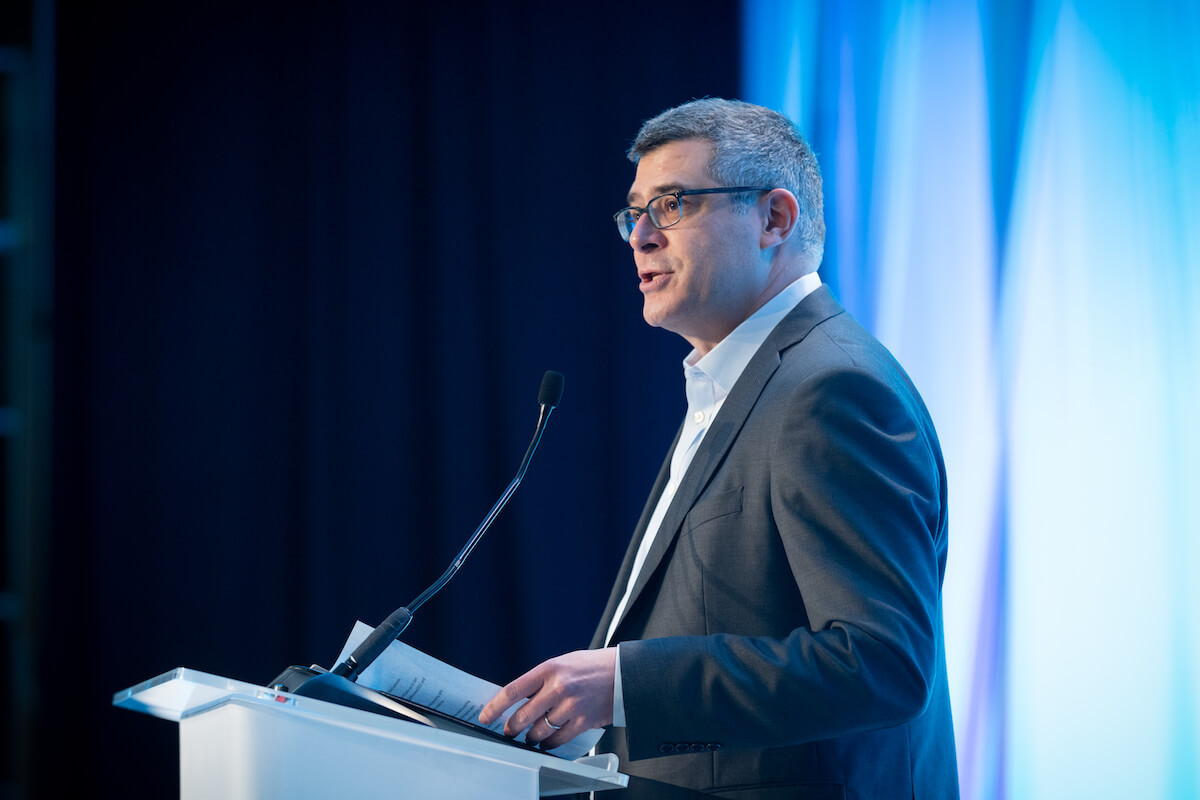Greetings, ImpactAlpha readers!
This week we’re introducing the new ImpactAlpha. Read all about it here. For the next two weeks, we’ll be previewing many of our new features. Right now, you can lock in your subscription at $399.00 –– a $200.00 discount –– for a year of smart, daily impact investing coverage and unlimited access to ImpactAlpha.
Featured: Returns on Investment podcast
When institutional investors demand impact, people listen (podcast). Pension and sovereign wealth funds, supertankers of global finance with assets of $100 billion or more, have long been considered stodgy and risk-averse. Risk aversion has now led them to a growing interest in impact themes around climate, resources and economic inclusion. Some leaders are going beyond risk-mitigation and seeking upside impact opportunities as well. “Pensions and sovereigns are looking for strategies that take advantage of sustainability-oriented themes or threats, and allow them to play that strategy,” said Dave Chen, head of Equilibrium Capital in Portland, Ore., in the latest episode of the Returns on Investment podcast. From impact asset managers, Chen said, “You’re seeing a wave of institutional-quality strategies and institutional scale.”
Chen, a longtime friend and past sponsor of ImpactAlpha, is helping Returns on Investment chart the institutional investor shift now underway. Why? “If you believe that the kind of sustainability impact and challenges we face are of a planetary scale, we’re going to have to move large blocks of capital,” he told ImpactAlpha’s David Bank. Billionaires and tech titans that are pointing resources toward moonshots and breakthroughs are important. But it’s institutional asset owners who will primarily finance the global building of sustainable systems for food, water, energy, housing and health care. For institutional investors, Chen says, “It’s all about risk and opportunity.”
Read on and have a listen to the Returns on Investment interview with Dave Chen: “Institutional investors come for the risk reduction, stay for the impact (podcast).” Listen to all the episodes of Returns on Investment on ImpactAlpha.com.
Special: The New ImpactAlpha
New features at ImpactAlpha.com. We redesigned our website as part of the new ImpactAlpha we introduced yesterday. The new ImpactAlpha.com responds to readers who told us they wanted easier access to featured and latest articles, and better navigation through ImpactAlpha’s deep content. We’re still tinkering, but invite you to take a spin and find:
- An “infinity scroll” of articles, updated throughout the day;
- Crisp and direct takeaways for each post for easy skimming;
- Thematic coverage organized into easy-to-use drop-down menus;
- An archive of ImpactAlpha’s editorial vault, searchable by date, theme, geography and content type;
- Subscription management… that blue “Alpha” logo on the bottom right lets you manage your newsletters, your account and your profile;
Impact Voices: From the Community
What’s the fiduciary duty of index investors when it comes to gun companies? That gun companies are part of widely used stock indexes does not mean that passive investors need remain passive. “Investors should be asking how much gun violence costs the economy in medical care and lost wages. How much of our educational budget is spent on protection? How is the tourism industry affected? Can gun makers alter these outcomes?” writes Rick Alexander, the head of legal at B Lab, which certifies socially-minded B Corps. In a guest post on ImpactAlpha, Alexander argues that BlackRock, State Street, Vanguard and other index investors must pressure gun makers to reduce such costs and avoid systemic risks. “The idea that investment managers are legally compelled to insist that each separate company in a portfolio create as much shareholder return as possible is doubly wrong,” Alexander writes.
Read, “What’s the fiduciary duty of index investors when it comes to gun companies?,” by Rick Alexander, B Lab’s head of legal, on ImpactAlpha.
Signals: Ahead of the Curve
Smart subsidies can help make agricultural finance more inclusive. The ‘S’ word is still sensitive for many investors (see “Do impact investments need subsidies?”). But more than two dozen funders, including Skoll Foundation, Gates Foundation, Rockefeller Foundation, Shell Foundation and MasterCard Foundation, are deploying “smart subsidies” to tilt global agriculture finance markets toward small farmers. The Initiative for Smallholder Finance details strategies in a new briefing, “The role of grant funding in smallholder finance.” The smallholder-farmer finance advisory is aiming to kick-start investment into high-impact service providers.
- In short… The funders say grants and other concessionary capital should accelerate markets, not replace them.
- Catalytic levers… Such subsidies are “smart” if they reduce real and perceived risks of operating in emerging and frontier markets.
- New models… The Shell Foundation, Ceniarth, and Small Foundation are testing models of asset-financing – to reduce food loss, for example – to identify high-impact and high-growth opportunities in India and Africa.
- Follow ImpactAlpha’s full coverage… of Farmer Finance.
Agents of Impact
SOCAP 365 is exploring alternative investment structures in San Francisco on Wednesday, Apr. 4, featuring author Jenny Kassan, BALLE’s Rodney Foxworth, Aner Ben-Ami of the Candide Group, and Beneficial Returns’ Ted Levinson… BALLE announced 25 Local Economy Fellows who are championing regenerative rural enterprises in St. Paul, Minn., Chapel Hill, NC, Vancouver, BC and elsewhere… University of Zurich (with Convergence and the Social Finance Academy) is offering a three-day executive program “Impact Investment & Blended Finance for Development Agencies & Foundations,” Aug. 29-31.
Dealflow: Follow the Money
Atlanta and Baltimore to finance green infrastructure with ‘environmental impact bonds.’ Baltimore is looking to raise $6 million to reduce polluting runoff into the Chesapeake Bay. Atlanta seeks to raise $12.9 million to minimize flooding and improve drainage on the city’s west side. Read more.
Vox Capital backs Sanar to train healthcare professionals in Brazil. The startup develops teaching materials for healthcare professionals, as well as students studying for medical careers. Dig in.
SoftBank backs Saudi Arabia’s ambitious solar effort. SoftBank is backing the first, $5 billion, 7.2-gigawatt phase of the project, committing $1 billion from its $93 billion Vision Fund. Read on.
Ellevest’s women-focused impact fund draws scrutiny. Ellevest touted its “impact portfolio” as supporting small businesses owned by women and other underrepresented populations. But some ImpactAlpha readers said they were disappointed in the products Ellevest is selling. “Impact washing at its finest,” wrote one critic. Find out more.
- Low bar? Antony Bugg-Levine, CEO of the Nonprofit Finance Fund, looked into the underlying portfolio and tweeted they were hardly high-impact or history-making. “Just seems that in 2018, with all the hard work of so many people to build real impact investing product, you all could aim higher,” he added.
- Dig deeper. Of the 21 asset classes in the Ellevest Impact Portfolios, five include investments in impact funds: Pax Ellevate Global Women’s Leadership Fund, SPDR SSGA Gender Diversity ETF, iShares MSCI EAFE, iShares MSCI EM, Access Community Capital Fund. Scroll down this link to dig into the portfolio. We will, too.
Click here for more ImpactAlpha dealflow. Send deal tips and news to [email protected].











